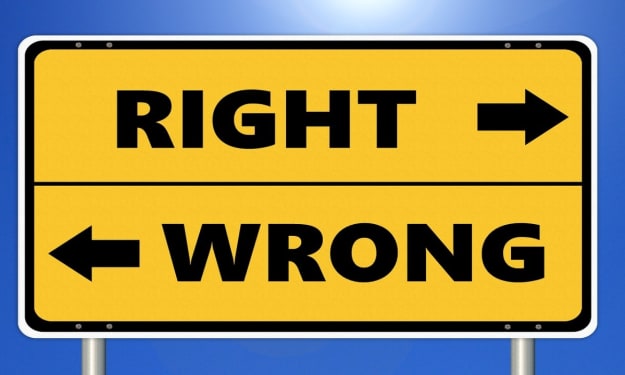Ethical Dilemmas That Leaders Face
When doing the wrong thing is the right thing to do

Is it ethical for a leader to make an unethical or immoral decision? Clearly, if you dare to lead, you will be frequently faced with such dilemmas. Yes, you may have to decide to do the “wrong thing” for the right reason.
It’s rarely Black or White.
Truth, personal sacrifice, and a desire to support the “greater good” are excellent criteria for anyone’s moral compass. But what if these elements conflict with each other? For instance, a leader may find that it is necessary to lie to protect a large group of people. This may even involve preventing injuries or saving lives. On the other hand, while most public servants are advised to avoid conflicts when a perceived benefit to themselves or a family member may be involved, what if voting on a resolution where a personal conflict may exist also helps secure future jobs for hundreds or thousands of constituents—to include those in poverty?
Is it ethical not to make an unethical decision?
Let’s take that last scenario a step further. If a political leader knows that the greater good will be served by a decision, yet abstains from a vote because of a personal conflict, and thus prevents the good from happening, is she acting unethically? Surely, ethics laws have not been violated. And, she avoids a potential censure, a possible criminal conviction, and the ending of her political career. So, many would say that she has done “the right thing,” although she has most likely hurt those who trust her.
I’ve seen forms of this scenario happen multiple times locally, at a state-level, and even nationally. Political opponents are the quickest to criticize when their opponent—and especially an incumbent—has been faced with ethical dilemmas and made difficult decisions. Making ethically difficult decisions is where the phase “judged by history” will apply.
Leaders must be willing to make hard decisions.
I sincerely believe that most of us disdain the weak, spineless political/business/religious position holder who avoids making hard decisions. Early in my military career, when I had an assignment at a local Army Depot where over 97 percent of the workers where civilians, I saw way too many people in authority who were unwilling to make any decisions or take responsibility. They had advanced their careers by avoiding any opportunity to be blamed.
For instance, once as a young industrial engineer who needed the “chain of command” to sign off on one of my shop drawings, several managers refused to affix their signatures as they feared that the proposed design my have a flaw that would adversely affect their careers. I took my concerns to the head of the directorate, who just happened to be an Army ordinance colonel and was very aware of the bureaucratic weaknesses of his subordinate managers. Once he signed the drawings thereby taking primary responsibility, others willingly signed (Protocol dictated that they drawings be approved from the bottom up rather than top down). In the American military culture, it is part of our values to willingly make hard decisions. But that ethos is way too often not shared by civilian politicians and bureaucrats.
Can the wisdom of hard decision making be trained?
I’m a strong believer that a person’s moral compass is developed during their first eight years. This is not new. Even Aristotle said, “Give me a child until he is seven, and I will show you the man.” Whether you accept age seven or eight, the thought is still the same. Parents, teachers, ministers, neighbors, and even friends during a person’s early years shape the values you will use over your lifetime.
Yet, many professions have training programs designed to address ethics thereby implying that is where morality is rooted. I’ve seen this in the medicine, law, journalism, mental health, and even—to a lesser extent—in business schools. Even the military has classes on Standards of Conduct and the Law of Warfare to which newbies and careerists are subjected to on a regular basis. But as core ethical values are established, most likely at least a decade before attendance of such training, I would argue that the primary purpose of such training is not to indoctrinate the audience, but to identify those who don’t have the moral compasses expected of the profession. I remember the strong reaction in a Law of Warfare class when I was a young captain and a Marine began arguing with the instructor. The Marine was advocating a practice that was inhumane, and clearly contrary to international laws and norms. He was clearly out of sync with the prevailing norms of the instructor and the rest of the class's officers.
Incidentally, I’ve also seen excellent leadership development in sports programs, starting with high school athlete’s character development. I’ve even seen it in certain academic programs such as in very intense film schools that are very strict in their standards both during production, and when it comes to the ethics of storytelling.
Communities and organizations will not prosper without leaders willing to make hard decisions .
The willingness to make hard decisions is a huge part of effective leadership. When a community or organization lacks such courageous leadership, they suffer. Going back to the depot example where managers in our largest directorate were overly cautious when it came to taking responsibility, we suffered. The Army’s industrial base is always in competition with civilian contractors who claim that they can perform a needed vehicle or weapon overhaul cheaper and faster for the taxpayers. Unfortunately for the Army’s depots, these civilian entities often have more courageous leaders. During my depot assignment and after (when I resigned my Regular Army commission and started a business locally), I constantly saw the depot lose missions, thereby reducing its civilian workforce. This was devastating to the local community, which relied on depot jobs.
In my hometown I’ve also seen the consequences. Way too many of our local politicians have never been in a profession, which included leadership development programs that weeded out those with ineffective moral compasses (Or they were in a profession that required such training for only a portion of their managers and leaders at a higher level). Again, when leaders are not willing to step out on a limb and make hard decisions, you can see the results in a variety of areas such as crime, poverty, and lackluster economic development. Character and solid leadership cannot come from certification programs that fail to weed out those without an adequate moral compass that should have been developed early in life.
Please understand that I am not promoting progress through dishonesty, selfishness, or disregard for the benefit of others. But what I am saying is that leaders are sometimes forced to make difficult decisions to include ones that may have un-hoped for adverse consequences. It is the failure to take risk that impedes success, rather than the willingness of embracing questionable values. Yet, there will be times when ethical, damned-if-you-do and damned-if-you-don't decisions have to be made. And, when a political entity or organization is faced with such a situation, they need leaders who can make the call—even though ethical ones will still have regrets that they had to compromise. Hopefully, such situations should be rare. But in political arenas, I see it more than the uninformed would imagine.
Leaders make the hard decisions .
In summary, a community or organization cannot prosper without having key actors who are willing and able to make hard decisions, which require them to choose which criteria—truth, personal sacrifice, or the greater good—will be the most important. And, that will inevitably mean that they may have to do the wrong thing for the right reason. Therefore, they must be people who are willing to take a risk, shoulder responsibility, and endure criticism. But without such courageous leaders, rarely will they reach their potential.






Comments
There are no comments for this story
Be the first to respond and start the conversation.